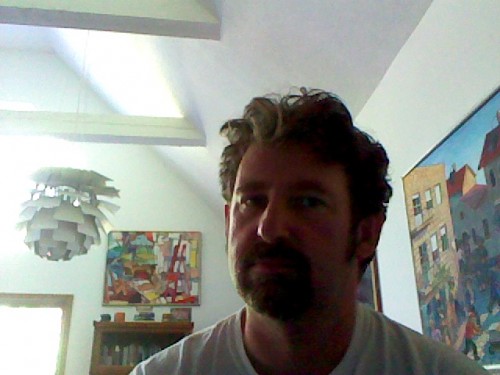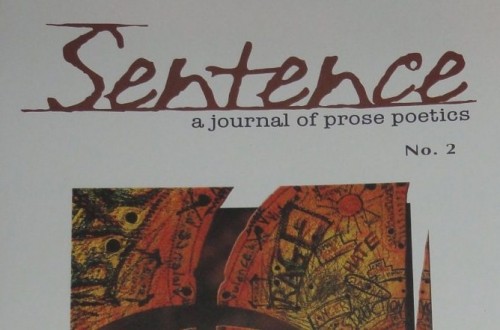……No More Sentence(s)……
***
The forthcoming, and 10th, issue of “Sentence: A Journal of Prose Poetics” will be the last. Yes, of course, just like people are born and die, journals come and go:
And yet— And yet—
Sentence is where I discovered poems and poets that changed the way I wrote: poems and poets (dead and alive, American and otherwise) that changed the way I thought about Poetry and its possibilities. Furthermore, Brian Clements, one of the founders and long-time editor of Sentence, was my first and best mentor when I began writing again (and for real) in Dallas in the late 1990’s.
***
So, to follow is a little Q & A that I just did with Brian which, among other things, looks back a bit over Sentence’s excellent 10 year run :
(note: back issues, except 1 and 2, are still available)
And yet— And yet—
***
Rauan: The Prose Poem seems to be in a much better place than it was when you started Sentence in 2003? I mean that now it seems Prose Poems are welcome and present just about anywhere. Is this part of the reason you’ve decided to stop?
Brian: I don’t know if the prose poem is in a better place; it’s in a different place than it was when Sentence started. I think 15 years ago the predominate mode in prose poetry was narrative, usually quasi-surrealist; now, as you say, you can find prose poems in a variety of modes in just about all (non-reactionary) journals. Sentence perhaps played a role in that shift. The near ubiquity of the prose poem does have something to do with the decision to end Sentence’s run. We’re just not sure the journal is necessary any more.
***
RK: The first several issues of Sentence were tremendously important to me. In them I discovered so many interesting, inspiring and instructive voices. One of the special features you ran, on French Prose Poets, was particularly important to me, introducing me to the work of Follain, Ponge and Jacob. Can you tell us about some of these features?
BC: The Features were among my favorite parts of Sentence as well. The most popular features were Susan Briante’s excellent section on Prose Poems in Spanish (#2) and Dean Rader’s groundbreaking section on Native American Prose Poems (#7), the first such collection ever. Both had excellent introductions, as did Nikki Santilli’s section on The Prose Poem in Great Britain (#3), one of my faves. Steve Bradbury and his co-curators put together an important collection of East Asian prose poems. All of the Features were excellent, though, and I appreciate the hard work that all of the Feature curators put into their sections.
Sentence would not have been as substantial as it was without the Feature sections and the Views & Reviews section, which Ellen McGrath Smith took over about halfway through Sentence’s run. If one collected all of the reviews and essays from those sections over the years into a volume, you’d have an excellent overview of contemporary prose poetry. Hmm…
***
RK: If the Prose Poem is a dog then it’s a dog of myriad breeds. Dogs that are cats even. Dog-cat hybrids. Dog that can fly like pigs (Pig-dogs), explode like helium balloons, or rot like cold vulture eyes. Can you tell us about some of the poems (ones you published or passed over) that really surprised you in some way or another (form, content, tone, whatever)?
BC: A few people have asked why I haven’t done a “Best of” anthology, and the answer is because it would be impossible to cull a collection of “best” out of the issues. The anthology would just be all of the poems that ever appeared in Sentence. But there were certainly poems that surprised me (isn’t that what all editors are looking for, after all, to be surprised?), and they tended to be of that hybrid nature that you mention. Some come to mind: Denise Duhamel’s amazing section of Mille et un sentiments, which I then had the pleasure of publishing as a Firewheel title; the always strange and beautiful work of Jeff Harrison and DE Steward; Nwenna Kai’s travelogue piece “Vagabond;” Theo Hummer’s postcard poems; Sandy McIntosh’s mock essays; James Grinwis’s“Signs of Electricity” poems with illustrations; I could go on for pages.
And it was always a pleasure to find great work by young poets and to be among the first to have the honor of publishing their poems—Ana Delgadillo’s prose poem about being born during an earthquake in Oaxaca; Matthew Dickman’s “Ruth to Esther” in #1; Tanesia Hale-Jones’s very wide hybrids; Roxane Beth Johnson; BJ Best; Patrick Crerand; Craig Blais; Ben Cartwright; and so on.
And I will never forget the first time I read Gabriel Gudding’s “The Repulsive Dolphin.” It (the poem, the experience of reading it) is scorched into my brain.
I do have to say, though, that there are poets and thinkers who never made it into Sentence (not for my not trying), and that’s one of my few regrets—Ron Silliman leaps to mind, as the journal’s title was partially inspired by The New Sentence.
***
RK: I remember reading an interview with the late Morgan Lucas Schuldt (Cue, a journal of prose poems) in which he lamented how many bad Edson-like Fabulist poems with talking animals came across his desk. What type of prose poems did you get more than your fair share of?
BC: We got a lot of everything. I don’t blame anyone for emulating Edson, especially young poets trying to find their way into poetry. The only thing that ever really irked me was when people would send a batch of sonnets or villanelles. Sentence, of course, leaned toward the more lyrical and experimental than toward the narrative and descriptive, so we probably rejected a much heavier load of story poems than anything else.
***
RK: If someone asked you where they might consider submitting their prose poems what suggestions would you give them? (i know this “depends” but please humor me)
BC: Just about any journal that doesn’t have the editorial vision of a conservative academic journal circa 1940. Almost all journals publish prose poems now, so the trick is not finding one that publishes prose poems (it’s almost passé to even ask the question these days), but finding one with a vision or a poetics in line with your own. I’ve always been fond of jubilat and Quarter After Eight. CUE is not around anymore, of course, but I thought Morgan Lucas Schuldt published an excellent journal. New American Writing is a good place to send prose poems and is perhaps my favorite journal. It’s never really clear to me whether Double Room is on or off, but it seems to be on right now, so that’s a great place to send. Anyone who has ekphrastic prose poems or poems about rediscovered objects should send to a new journal some of my students are launching, Poor Yorick.
***
RK: what are you reading these days? what are you writing?
BC: Right now I’m reading Zealot just to spite Fox News alongside Douglas Hofstadter’s newest book Surfaces and Essencesand Marvin Minsky’sThe Emotion Machine. I’m looking forward to reading Michael Grabell’s forthcoming chapbook Macho Man and Brenda Hillman’s latest book. Also looking forward to publishing another book of prose poems by Denise Duhamel, Help in 47 Languages, before the end of the year.
For the last 9 months or so, my writing effort has been dominated by missives to legislators, letters to editors, communications with various advocacy organizations, and information sharing with like-minded individuals who want to take action to reduce gun violence in the US. I haven’t written a single poem since 12/14/12, but I have done a little editing on a manuscript called The Hard Problem.
***

“The only thing that ever really irked me was when people would send a batch of sonnets or villanelles” — (Brian Clements, Editor)
***
Brian Clements founded Firewheel Editions in the late 90s in Dallas and shortly thereafter founded Sentence: a journal of prose poetics in collaboration with Gregg Thompson and Michael Puttonen, close on the heels of the demise of Peter Johnson’s The Prose Poem: an International Journal. He is the author of several books of poems and editor with Jamey Dunham of the anthology An Introduction to the Prose Poem (Firewheel Editions). Clements coordinates the MFA in Creative and Professional Writing at Western Connecticut State University.
***
Tags: BRIAN CLEMENTS, sentence


I’m sad to see them go. Sentence was a great mag. Goodnight, sweet prince.
yes, indeed, goodnight — (a candle)